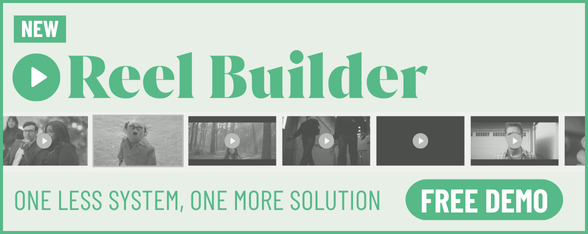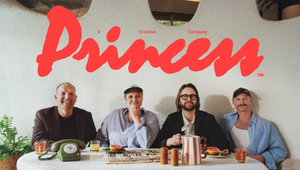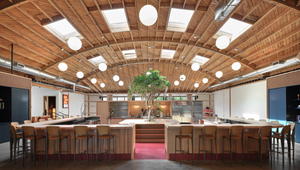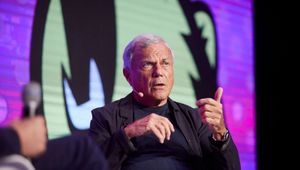
After WPP, Ajaz Ahmed’s Studio.One Is Creating Not Just a New Company, But a New Category

Six months ago, Ajaz Ahmed was the CEO of AKQA, a company he co-founded at 21, won 83 'Agency of the Year’ awards, and sold a majority stake to WPP in 2012. Now, Ajaz is back with Studio.One, an independent agency that he says is breaking free of the holding company structure that was holding Ajaz – and the work – back.
“It’s not often you get the chance to rearchitect an entire industry,” says Ajaz of Studio.One’s launch. For him it represents not “another chapter but a whole new story” that’ll actively apply ‘first principles’ thinking to problems “because we’re not interested in patching up or tinkering with the old model, we’d rather build something fresh,” in Ajaz’s own words. It’s also being built “in the AI age, not retrofitted for it. That means we can offload the procedural, and design everything around intelligent automation from day one,” he explains. And he’ll be building the agency with financial investment from Atrum Group, continuing his relationship with private equity firms which were “some of the most enjoyable times in my career,” Ajaz says.
For Studio.One, the ideal isn’t defined by scale or industry but by mindset, according to Ajaz. “We’re looking for clients who appreciate that value is created through quality of thinking, not volume of outputs. It’s about shared values and partnering with organisations who appreciate ideas rather than just going through the motions and doing what's been done in the past. We’re drawn to the challengers, the category-definers where the leadership recognises that it's about reimagining business models, customer experiences, and value creation itself.”
“When we align on values and vision first, we create the conditions for work that doesn’t just solve problems but can open new frontiers,” Ajaz adds, laying out his ambitions for the kind of work Studio.One is gearing up to take and deliver on.

Why now? “We’re at an inflection point and the industry is going through massive upheaval. Technologies are evolving faster than organisations can adapt and have reached a threshold that unlocks new possibilities. In the creative industries, it's never been about owning the most resources but about unlocking the most originality. The previous agency model was built for a linear world, but we now operate in an exponential environment. This demands a complete rethinking of how creative work happens instead of just incremental improvements to outdated systems,” he explains.
For a long time, the industry looked favourably on “sprawling incumbents, the global networks with vast infrastructure and the capability to absorb risk that start-ups simply couldn’t match,” posits Ajaz, but the tides have recently turned to be favourable to independents. Ajaz points to the irony of the position occupied by holding companies that “position themselves as growth experts for clients” though “most have reported underwhelming results and failed to deliver growth themselves, which is a reflection of the structural problems they are facing. The bureaucratic scaffolding in the large agency groups, the very systems built to protect scale, have become a straightjacket and another reason for their stagnation.”
A change in the client/employee expectations coupled with access to new technologies “democratised capability,” Ajaz says, so “the gap between vision and execution has near collapsed. Start-ups in the creative sphere are no longer at a structural disadvantage. Independents can now outmanoeuvre the large agencies, often outpacing the legacy giants because they’re unencumbered by bureaucracy, outdated systems, or cultural inertia.”
For Ajaz and Studio.One this is a historic moment for those “willing to seize it” as technology “isn’t just flattening markets, it’s also flattening hierarchies.” Bravery is still needed to launch amid the difficult market conditions and Ajaz says that those who do are “builders, but much of the management layers in holding companies are blockers.”
Complacency is the force Studio.One is positioning itself most diametrically to and which Ajaz plans to counter with the aforementioned ‘first principles’ thinking. It’s a chance to “rethink established practices” and “to ignore the past and focus on what truly matters. Instead of accepting inherited norms like billable hours, bloated organisational layers, or archaic bureaucracy, we’re questioning their very existence,” he adds.
Studio.One is going to operate “as a force multiplier, amplifying the impact of talent, ideas, and technology rather than diluting them through unnecessary processes. We’ve seen firsthand how traditional agencies struggle with specific friction points that diminish creativity such as decision cycles that stretch weeks and even months when they should take hours; creative concepts filtered through so many layers that they lose their edge; technology implementations that are outdated before they launch; teams structured around internal hierarchies rather than client outcomes; revenue models that incentivise hours spent rather than value delivered,” Ajaz says.
Ajaz is confident that “independent agencies like Studio.One won’t get boxed in by convention, process, or politics. We’re free from constraints, unconcerned with fitting into legacy systems, and represent an alternative to obsolete institutional thinking.” And he’s critical, of course, of the current holding company offering. “A holding company might have a so-called ‘campus’, which is just a few floors in a building, but the independents have the energy, and that’s where all the excitement in the industry is right now.”
Studio.One is designed around three interconnected engines: creativity, culture, and capital. “Our Brand Innovation Studio is where creativity and technology build long-term relationships between clients and their audiences. With a focus on value creation, we’re shaping new models that are more flexible and outcome-oriented than current options.
“The Studio.One Lab serves as our research and innovation workshop and is a catalyst for experimentation. Here, we collaborate with engineers, athletes, artists, founders, and cultural figures to explore new possibilities and test ideas that challenge convention.
“Studio.One is also a growth partner to private equity firms, where we help build stronger moats and unlock hidden value in their portfolio companies by deploying better customer experiences and meaningful brand development,” Ajaz explains. “Some of the most valuable opportunities emerge where cultural relevance meets commercial potential, and new markets open up.”
Connecting it all is Studio.One’s defining ethos, Spirit Untamed. For Ajaz it’s representative of the “freedom to think without limits, to question the status quo and to explore ideas that are considered impossible because that’s where the true breakthroughs live.”
Populating Studio.One with talent ready to “break the mould” is a priority for Ajaz and he sees the “old division between ‘creatives’ and ‘technologists’ antiquated in a world where the most innovative solutions emerge at the intersection of both disciplines.” So, rather than organising around conventional ‘departments’, the agency is building around specific challenges and opportunities, he explains. In practice, this outlook needs “people comfortable with ambiguity and capable of deep specialisation while maintaining a broader perspective.”
Building a robust company culture is likewise essential to Studio.One. Crucially, “culture isn’t just about creating a pleasant environment; it’s a central strategic advantage for any organisation,” states Ajaz. He’s against the approach of “extracting maximum billable hours through overwork,” saying it’s “fundamentally at odds with the way we can work.” Ajaz is highly aware that talent’s ability to live outside of work is what helps them work best too and “allow them to lead fulfilling lives,” he says, adding “instead of building for scale, we can build for soul.”
After being so close to the eye of the storm for many years, Ajaz’s diagnosis of the industry should serve as a warning. “Over the last few years the creative industry was in danger of becoming homogenous, slow, and tired because the traditional agency model, and the traditional holding company model, was built for a world that no longer exists,” he reiterates. With Studio.One, Ajaz is “creating not just a new company but a new category.” The goal? “Not to be the biggest agency but to help redefine what’s possible when human creativity and adaptive intelligence work in harmony.” It’s an ambitious vision and the industry will be watching keenly to see it realised.















